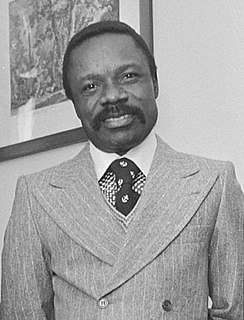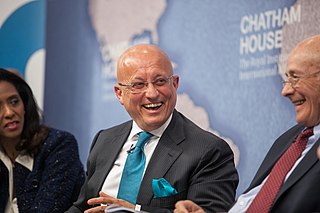A Quote by Omar Bongo
But it is important to observe that when Europe or the United Nations impose sanctions that are supposed to be aimed against a certain regime, usually generally millions of people end up being directly punished.
Related Quotes
US opposition to Russia and China has entailed sanctions against Russia, and Russia in turn has made counter-sanctions against Europe. So Europe is essentially sacrificing its opportunities for trade and investment in order to remain part of NATO. It is also agreeing to bomb Syria and the Near East, creating a wave of refugees that it doesn't know what to do with.
Israel's discourse with the United States on the subject of Iran's nuclear project is more significant, and more fraught, than it is with Europe. The U.S. has made efforts to stiffen sanctions against Iran and to mobilize countries like Russia and China to apply sanctions in exchange for substantial American concessions.
That`s how you end up with a guy like Dan Fried, overseeing the U.S. sanctions against Russia for Russia did in Ukraine and Crimea.Russia hates those sanctions more than they love life. They hate those sanctions. So, of course, you need your toughest and most experienced guy running those sanctions.
At the U.N., I routinely encounter countries that do not want to impose sanctions or even to enforce those already on the books. The hard-line sanctions skeptics have their own self-interested reasons for opposing sanctions, but they ground their opposition in claims that America uses sanctions to inflict punishment for punishment's sake.
Everybody knows that the United Nations is not the Secretary-General; he has an important position, but the United Nations is the states within this organization, and to be frank, most of the people say only the five permanent members; this is the United Nations because they have the veto, they can do whatever they want and they can refuse whatever they want, and if there's a reform that is very much needed for this organization.
There are many who criticise the United Nations. And those of us who know this institution well know that it is not immune from criticism. But those who argue against the United Nations advance no credible argument as to what should replace it. Whatever its imperfections, the United Nations represents a necessary democracy of states.
Regime change has been an American policy under the Clinton administration, and it is the current policy. I support the policy. But regime change in and of itself is not sufficient justification for going to war--particularly unilaterally--unless regime change is the only way to disarm Iraq of the weapons of mass destruction pursuant to the United Nations resolution.










































